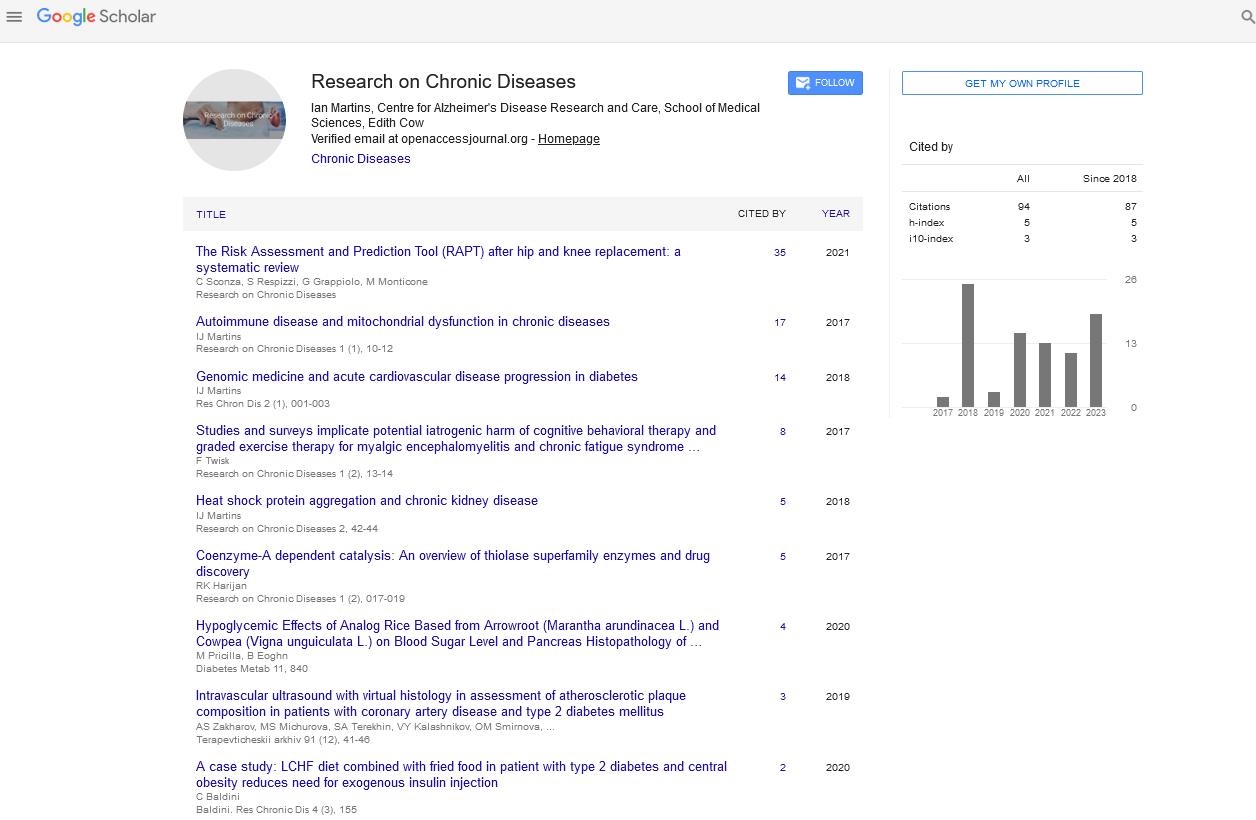Perspective - Research on Chronic Diseases (2023) Volume 7, Issue 6
Thyroid Disorders: Unraveling the Impact, Types, and Management Strategies
- Corresponding Author:
- Massimo Attanasio
Department of General Medicine, University of Milan, Milan, Italy
E-mail: attanasioni695@unipa.it
Received: 13-Nov-2023, Manuscript No. OARCD-23-119486; Editor assigned: 15-Nov-2023, PreQC No. OARCD-23-119486 (PQ); Reviewed: 29-Nov-2023, QC No. OARCD-23-119486; Revised: 06-Dec-2023, Manuscript No. OARCD-23-119486 (R); Published: 13-Dec-2023, DOI: 10.37532/OARCD.2023.7(6).131-132
Introduction
The thyroid, a small butterfly-shaped gland located in the neck, plays a crucial role in regulating various bodily functions. This master gland secretes hormones that influence metabolism, growth, and energy production. Thyroid disorders, a group of conditions affecting the thyroid’s function, are prevalent worldwide, affecting individuals of all ages. Understanding the complexities of thyroid disorders, their impact on health, types, diagnostic approaches, and management strategies is essential in addressing these prevalent health concerns.
Exploring thyroid function and hormones
The thyroid gland produces two primary hormones: Triiodothyronine (T3) and Thyroxine (T4). These hormones regulate the body’s metabolism, affecting vital processes such as heart rate, body temperature, and energy levels. The production and secretion of these hormones are intricately regulated by the hypothalamus and pituitary gland through a feedback mechanism known as the Hypothalamic-Pituitary-Thyroid (HPT) axis.
Types of thyroid disorders
Thyroid disorders encompass various conditions that can arise due to an imbalance in thyroid hormone production or thyroid gland irregularities. The most common types include:
• Hypothyroidism: This condition occurs when the thyroid gland doesn’t produce enough hormones, leading to a slowdown in bodily functions. Symptoms may include fatigue, weight gain, cold intolerance, and dry skin. • Hyperthyroidism: Characterized by an overactive thyroid gland producing excessive hormones, hyperthyroidism accelerates the body’s metabolic rate. Symptoms can include weight loss, rapid heart rate, anxiety, and heat intolerance. • Thyroid nodules: These are growths or lumps in the thyroid gland that can be benign or, in rare cases, cancerous. They might not cause noticeable symptoms but can sometimes lead to thyroid hormone imbalances. • Thyroiditis: Inflammation of the thyroid gland, known as thyroiditis, can lead to hyperthyroidism or hypothyroidism, depending on the type and stage of the condition.
Impact and symptoms of thyroid disorders
Thyroid disorders can significantly impact an individual’s health and overall well-being. The symptoms experienced by individuals with thyroid disorders can vary depending on the type of condition and its severity. Some common symptoms include:
• Fatigue. • Weight changes. • Irregularities in heart rate. • Changes in body temperature sensitivity. • Changes in mood and cognitive function. • Hair and skin changes.
Menstrual irregularities in women
The wide array of symptoms associated with thyroid disorders often necessitates a comprehensive medical history, physical examinations, and specific laboratory tests for an accurate diagnosis.
Diagnostic approaches
The diagnosis of thyroid disorders involves a combination of patient history, physical examinations, and laboratory tests. Healthcare providers commonly conduct blood tests to measure levels of Thyroid hormones (T3, T4) and Thyroid-Stimulating Hormone (TSH). Elevated or decreased levels of these hormones can indicate specific thyroid conditions.
Imaging studies such as ultrasound, CT scans, or MRIs might also be employed to visualize the thyroid gland and identify any structural irregularities, nodules, or signs of inflammation.
Treatment and management strategies
Management of thyroid disorders depends on the specific condition and its underlying cause. Treatment approaches may include:
• Medications: For hypothyroidism, synthetic thyroid hormone replacement is commonly prescribed. For hyperthyroidism, medications to reduce hormone production or block hormone effects may be utilized. • Radioactive iodine therapy: This treatment aims to reduce thyroid hormone production in cases of hyperthyroidism or certain thyroid conditions. • Surgery: Surgical removal of part or all of the thyroid gland might be necessary in cases of thyroid nodules, goiters, or cancer. • Lifestyle modifications: Dietary changes, stress management, and regular exercise play a role in supporting overall thyroid health.
Description
Impact on women’s health
Thyroid disorders can have specific implications for women’s health, particularly in relation to pregnancy and reproductive health. Conditions such as hypothyroidism or hyperthyroidism can impact fertility, pregnancy outcomes, and postpartum health.
Pregnant women with thyroid disorders often require careful monitoring and, in some cases, adjustments in medication dosages to ensure a healthy pregnancy and reduce the risk of complications.
Advances and research in thyroid health
Ongoing research and medical advancements continue to contribute to a better understanding and management of thyroid disorders. Innovations in diagnostic tools, such as more sensitive and specific blood tests, aid in the early detection and precise monitoring of thyroid conditions.
The development of targeted therapies, precision medicine approaches, and advancements in surgical techniques contribute to improved treatment outcomes and quality of life for individuals affected by thyroid disorders.
Holistic approaches and future perspectives
The future of managing thyroid disorders emphasizes a holistic approach that integrates patient-centered care, advanced diagnostic tools, and personalized treatment strategies. Incorporating patient values and preferences, promoting preventive measures, and leveraging technological advancements to improve diagnosis and treatment stand as the focal points of evolving thyroid healthcare.
Moreover, the integration of alternative and complementary therapies, lifestyle modifications, and the utilization of integrative medicine approaches aim to provide more comprehensive care and support for individuals with thyroid disorders.
Conclusion
Thyroid disorders, prevalent and impactful conditions affecting the gland’s function and hormone production, significantly influence an individual’s health and well-being. Understanding the types, symptoms, diagnosis, and management strategies is crucial in addressing these conditions and promoting better health outcomes.
As research continues to advance, and healthcare evolves, the emphasis on personalized care, early detection, and the integration of innovative approaches will define the future of thyroid health. Ultimately, raising awareness, education, and fostering proactive health measures are key in addressing thyroid disorders, promoting overall well-being, and fostering a healthier future for individuals affected by these conditions.
